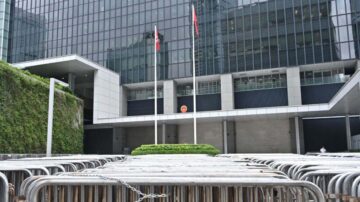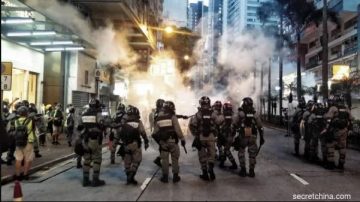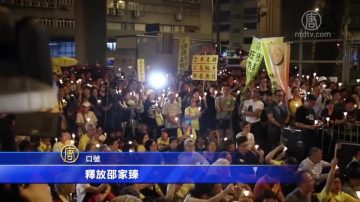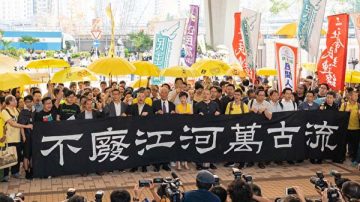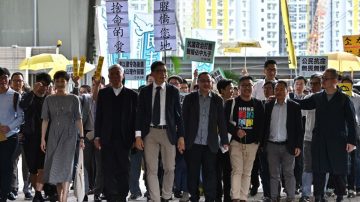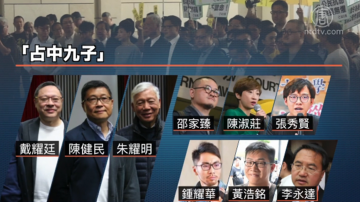【新唐人2014年10月01日讯】对于香港学生和市民持续多日的民主抗争运动,有舆论认为,这场运动类似1989年北京学运再现,让中共领导班子左右为难,既不能过于严厉打压,又无法马上结束。那么北京将如何应对呢?下面让我们看看专家的分析。
香港发起占领中环行动,各界人士可谓一呼百应。警察虽然试图强力驱离,不过越来越多的院校和各界民众,仍持续涌入抗争队伍。
不少人想起25年前春夏之交的北京六四学运。尽管香港此次抗争规模和波及范围都有所不同,但学生的诉求与当局的对应,从实质上有着惊人的相似。
9月29号,英国广播公司BBC中文网刊文“北京会否面对‘香港的1989’”。文章提到,89年的学运,因北京当局动用坦克军队弹压,嘎然而止。香港街头抗议的学生,也让那些曾经看到北京如何对付学生的人,感到担心。
处于紧张状态的香港,是否会触发北京的暴力镇压呢?
纽约城市大学政治学教授夏明分析,中共当局一旦认为必要,完全有可能像25年前一样,使用荷枪实弹对付抗议者。
纽约城市大学政治学教授夏明:“他们(中共高层)唯一的一个政治诉求,就是要维护今天的一党专制,那么在这种情况下,我觉得北京不惜采取最坏的打算,不应该超出目前北京已经发出的声音和已经显现的逻辑之外。”
但中国资深法学专家赵远明认为,尽管北京一时态度强硬,也不太可能出现类似1989年那种大屠杀,因为北京一旦采取镇压措施,和平抗争的香港学生会暂时退避。
中国资深法学专家赵远明:“从习李政权看,对于占中这个事态,应该是给他们逐渐的平息,然后合理的要求,应该给以答应或者解决,因为是争取真正的普选,这是香港民众的普遍心声,而且这是合理合法合情的。”
北京驻港机构中联办28号发表声明,谴责“占领中环”是非法集会,并强硬指出,中共人大的决定“不容挑战”;29号,中共喉舌《新华社》呼吁惩治所谓的“占中”幕后元凶。
中国民主大学校长、前六四学生唐伯桥表示,香港学生和市民是世界上最理智、最和平的抗议群体之一,他们没有向警察做出任何挑衅行为,香港政府却反派防暴警察施暴,才会导致占中行动遍地开花。
中国民主大学校长、前六四学生唐伯桥:“现在秩序很好,只是瘫痪了一部分交通,这次的占中行动,本来之意就是要瘫痪交通,然后,逼迫香港当局和中共当局作出回应,兑现对全体香港人的承诺。”
29号,有外媒报导说,梁振英和中共港澳领导小组组长张德江等人,28号晚向北京当局提议要“武力镇压”占中运动,但没有获得习近平的同意﹔29号,“环球时报”再次刊文鼓动派出武警镇压占中,但文章很快被移除。
美国中文杂志《中国事务》总编辑伍凡分析,在香港问题上,习近平和另一派系有分歧,那些提议“武力镇压”的人,是想藉机把习近平哄下台。
美国中文杂志《中国事务》总编辑伍凡:“这个事情不可能拖的很久了,我想最大的阻力来自于张德江,因为他是港澳小组组长,梁振英是马仔,当然可以随便换的,他不能左右大局,他也不掌握军队,他不能开枪。”
赵远明认为,面对香港民众抗暴的勇气,以及全球的关注和各国政府的声援,中共面临着巨大的压力和危机。但如果强力镇压,必将彻底瘫痪香港,毁掉香港。因此,他建议北京对香港的应对,让香港局势缓和的第一步,就是让梁振英下台。
How Will Beijing Handle "Hong Kong's 1989"?
As the democratic protest in Hong Kong continues,
many compare it to the 1989 Beijing students' movement.
Critics believe Beijing is faced with a dilemma; it can neither
harshly suppress the movement, nor end the protest.
How will the CCP handle the situation?
Let's hear what the experts have to say.
The Occupy Central movement has won public popularity—
despite forceful tactics from the police, more people from
colleges and various sectors continue to join the protest.
It reminds many of the student movement in Beijing
25 years ago; although rather different in the scale and scope,
the students' demands and the authorities' responses
are surprisingly similar.
On Sept. 29, BBC Chinese questioned how Beijing will react
to "Hong Kong's 1989".
It mentioned that tanks had brought an end to the 1989
students' protest in Beijing; people who had seen those scenes
are worried for Hong Kong's students.
Will Hong Kong's tension trigger violent repression
from Beijing?
Political science professor at City University of New York,
Xia Ming, believes that if the CCP considers it necessary,
using ammunition against the protesters is likely to happen,
just like it did 25 years ago.
Prof. Xia Ming: "The CCP's only political aspiration is to
maintain its one-party dictatorship.In this case,
I think Beijing will resort to the worst scenario
to ensure its principle is not bent."
Senior legal expert Zhao Yuanming does not believe that
massacre as in 1989 will happen again, despite Beijing's
tough stance, but says once Beijing resorts to repressive ways,
the peace-seeking students will temporarily retreat.
Zhao Yuanming: "From the perspective of Xi and Li's regime,
they should allow the Occupy Central to subside gradually
and agree or resolve it by meeting reasonable demands.
The demand for universal suffrage is a general aspiration
of the Hong Kong people; it is legitimate and sensible."
Beijing's Liaison Office in Hong Kong has condemned
the Occupy Central movement as illegal, and stresses that
the congress' decision on the 28th is "unchallengeable".
CCP mouthpiece Xinhua also called to punish the so-called
"culprit" behind the Occupy Central movement.
Democracy Academy of China president Tang Baiqiao says
Hong Kong's protest has been one of the most rational
and peaceful of demonstrations, and there has not been
any provocation towards the police.
The Hong Kong government dispatched the riot police
who have faced protesters with violence, but this has only
led to increased popularity for the Occupy Central movement.
Survivor of 1989 Tiananmen massacre, Tang Baiqiao:
"It's in good order now; only part of the traffic was stopped.
The intention of the activity was to paralyze traffic
and force the Hong Kong authorities and the CCP to respond
and to fulfill their commitment to Hong Kong."
Foreign media reported on Sept. 29 that Leung Chun-ying
and Hong Kong and Macau affair leader Zhang Dejiang
had proposed on the 28th to suppress the protest with "force",
but this was not agreed by Xi Jinping.
State media also published an article encouraging suppression
by armed police; this was quickly removed from the Internet.
China affairs magazine editor-in-chief Chris Wu analyzes that
those who suggest to "suppress with force" are the ones who
have differences with Xi Jinping and who hope to remove Xi.
Chris Wu: "It can't be dragged on for a long time;
I think Zhang Dejiang is the greatest resistance,
because he is Hong Kong and Macau's affair leader.
Leung Chun-ying is just a messenger and he can be easily
replaced; he cannot control the overall situation
as he doesn't hold the army, so he cannot open fire."
Zhao Yuanming believes the CCP is faced with a crisis
of tremendous pressure, due to the courage of the Hong Kong
people who are against violence, and due to concern
and solidarity from the international community.
He says strong repression will completely paralyze
and destroy Hong Kong, and therefore suggests that
Beijing have Leung Chun-ying step down,
as the first step in easing the situation in Hong Kong.
香港发起占领中环行动,各界人士可谓一呼百应。警察虽然试图强力驱离,不过越来越多的院校和各界民众,仍持续涌入抗争队伍。
不少人想起25年前春夏之交的北京六四学运。尽管香港此次抗争规模和波及范围都有所不同,但学生的诉求与当局的对应,从实质上有着惊人的相似。
9月29号,英国广播公司BBC中文网刊文“北京会否面对‘香港的1989’”。文章提到,89年的学运,因北京当局动用坦克军队弹压,嘎然而止。香港街头抗议的学生,也让那些曾经看到北京如何对付学生的人,感到担心。
处于紧张状态的香港,是否会触发北京的暴力镇压呢?
纽约城市大学政治学教授夏明分析,中共当局一旦认为必要,完全有可能像25年前一样,使用荷枪实弹对付抗议者。
纽约城市大学政治学教授夏明:“他们(中共高层)唯一的一个政治诉求,就是要维护今天的一党专制,那么在这种情况下,我觉得北京不惜采取最坏的打算,不应该超出目前北京已经发出的声音和已经显现的逻辑之外。”
但中国资深法学专家赵远明认为,尽管北京一时态度强硬,也不太可能出现类似1989年那种大屠杀,因为北京一旦采取镇压措施,和平抗争的香港学生会暂时退避。
中国资深法学专家赵远明:“从习李政权看,对于占中这个事态,应该是给他们逐渐的平息,然后合理的要求,应该给以答应或者解决,因为是争取真正的普选,这是香港民众的普遍心声,而且这是合理合法合情的。”
北京驻港机构中联办28号发表声明,谴责“占领中环”是非法集会,并强硬指出,中共人大的决定“不容挑战”;29号,中共喉舌《新华社》呼吁惩治所谓的“占中”幕后元凶。
中国民主大学校长、前六四学生唐伯桥表示,香港学生和市民是世界上最理智、最和平的抗议群体之一,他们没有向警察做出任何挑衅行为,香港政府却反派防暴警察施暴,才会导致占中行动遍地开花。
中国民主大学校长、前六四学生唐伯桥:“现在秩序很好,只是瘫痪了一部分交通,这次的占中行动,本来之意就是要瘫痪交通,然后,逼迫香港当局和中共当局作出回应,兑现对全体香港人的承诺。”
29号,有外媒报导说,梁振英和中共港澳领导小组组长张德江等人,28号晚向北京当局提议要“武力镇压”占中运动,但没有获得习近平的同意﹔29号,“环球时报”再次刊文鼓动派出武警镇压占中,但文章很快被移除。
美国中文杂志《中国事务》总编辑伍凡分析,在香港问题上,习近平和另一派系有分歧,那些提议“武力镇压”的人,是想藉机把习近平哄下台。
美国中文杂志《中国事务》总编辑伍凡:“这个事情不可能拖的很久了,我想最大的阻力来自于张德江,因为他是港澳小组组长,梁振英是马仔,当然可以随便换的,他不能左右大局,他也不掌握军队,他不能开枪。”
赵远明认为,面对香港民众抗暴的勇气,以及全球的关注和各国政府的声援,中共面临着巨大的压力和危机。但如果强力镇压,必将彻底瘫痪香港,毁掉香港。因此,他建议北京对香港的应对,让香港局势缓和的第一步,就是让梁振英下台。
How Will Beijing Handle "Hong Kong's 1989"?
As the democratic protest in Hong Kong continues,
many compare it to the 1989 Beijing students' movement.
Critics believe Beijing is faced with a dilemma; it can neither
harshly suppress the movement, nor end the protest.
How will the CCP handle the situation?
Let's hear what the experts have to say.
The Occupy Central movement has won public popularity—
despite forceful tactics from the police, more people from
colleges and various sectors continue to join the protest.
It reminds many of the student movement in Beijing
25 years ago; although rather different in the scale and scope,
the students' demands and the authorities' responses
are surprisingly similar.
On Sept. 29, BBC Chinese questioned how Beijing will react
to "Hong Kong's 1989".
It mentioned that tanks had brought an end to the 1989
students' protest in Beijing; people who had seen those scenes
are worried for Hong Kong's students.
Will Hong Kong's tension trigger violent repression
from Beijing?
Political science professor at City University of New York,
Xia Ming, believes that if the CCP considers it necessary,
using ammunition against the protesters is likely to happen,
just like it did 25 years ago.
Prof. Xia Ming: "The CCP's only political aspiration is to
maintain its one-party dictatorship.In this case,
I think Beijing will resort to the worst scenario
to ensure its principle is not bent."
Senior legal expert Zhao Yuanming does not believe that
massacre as in 1989 will happen again, despite Beijing's
tough stance, but says once Beijing resorts to repressive ways,
the peace-seeking students will temporarily retreat.
Zhao Yuanming: "From the perspective of Xi and Li's regime,
they should allow the Occupy Central to subside gradually
and agree or resolve it by meeting reasonable demands.
The demand for universal suffrage is a general aspiration
of the Hong Kong people; it is legitimate and sensible."
Beijing's Liaison Office in Hong Kong has condemned
the Occupy Central movement as illegal, and stresses that
the congress' decision on the 28th is "unchallengeable".
CCP mouthpiece Xinhua also called to punish the so-called
"culprit" behind the Occupy Central movement.
Democracy Academy of China president Tang Baiqiao says
Hong Kong's protest has been one of the most rational
and peaceful of demonstrations, and there has not been
any provocation towards the police.
The Hong Kong government dispatched the riot police
who have faced protesters with violence, but this has only
led to increased popularity for the Occupy Central movement.
Survivor of 1989 Tiananmen massacre, Tang Baiqiao:
"It's in good order now; only part of the traffic was stopped.
The intention of the activity was to paralyze traffic
and force the Hong Kong authorities and the CCP to respond
and to fulfill their commitment to Hong Kong."
Foreign media reported on Sept. 29 that Leung Chun-ying
and Hong Kong and Macau affair leader Zhang Dejiang
had proposed on the 28th to suppress the protest with "force",
but this was not agreed by Xi Jinping.
State media also published an article encouraging suppression
by armed police; this was quickly removed from the Internet.
China affairs magazine editor-in-chief Chris Wu analyzes that
those who suggest to "suppress with force" are the ones who
have differences with Xi Jinping and who hope to remove Xi.
Chris Wu: "It can't be dragged on for a long time;
I think Zhang Dejiang is the greatest resistance,
because he is Hong Kong and Macau's affair leader.
Leung Chun-ying is just a messenger and he can be easily
replaced; he cannot control the overall situation
as he doesn't hold the army, so he cannot open fire."
Zhao Yuanming believes the CCP is faced with a crisis
of tremendous pressure, due to the courage of the Hong Kong
people who are against violence, and due to concern
and solidarity from the international community.
He says strong repression will completely paralyze
and destroy Hong Kong, and therefore suggests that
Beijing have Leung Chun-ying step down,
as the first step in easing the situation in Hong Kong.

